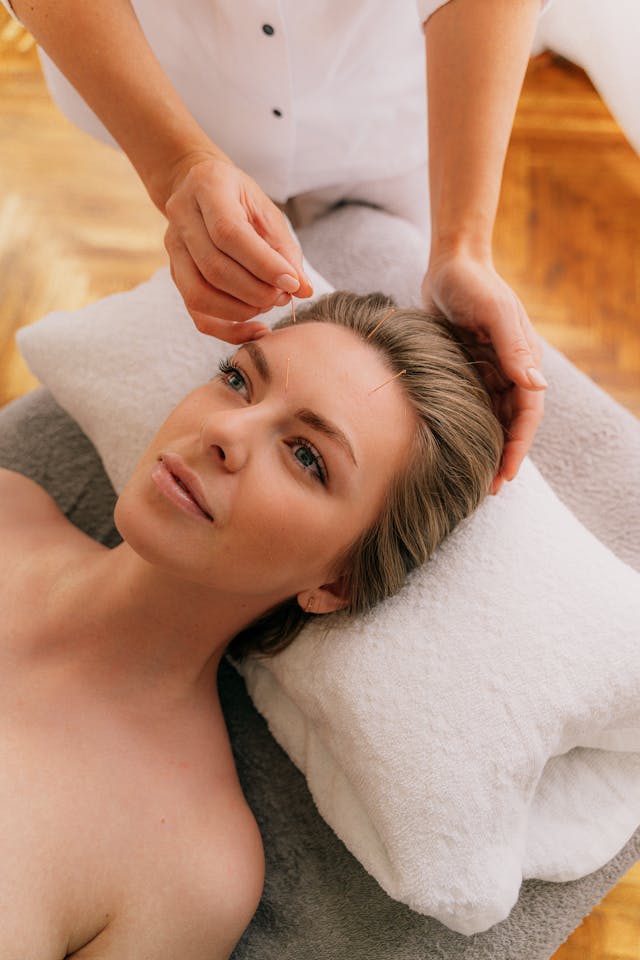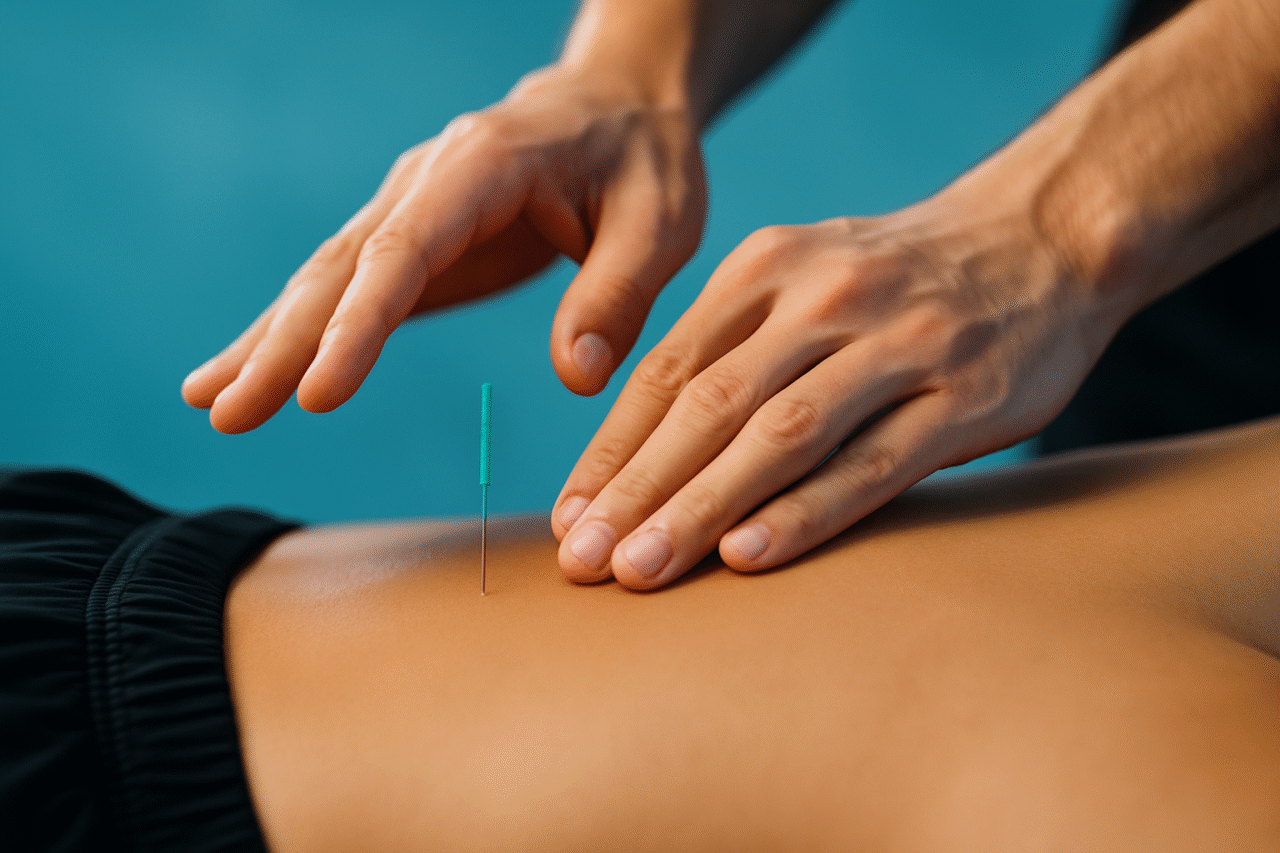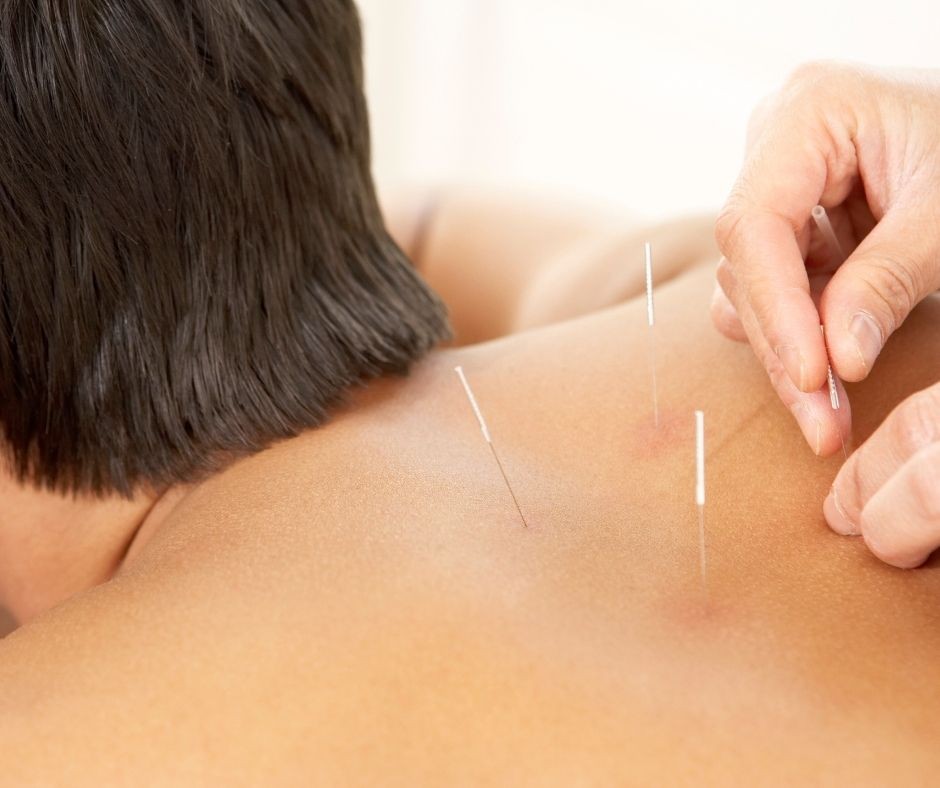
Acupuncture is a method people often turn to when managing feelings that come with stress and anxiety. It works by inserting extremely fine, sterile needles into specific points on the body, which is intended to encourage the body’s natural functions and promote a sense of calm.
Understanding How Acupuncture May Assist With Stress and Anxiety
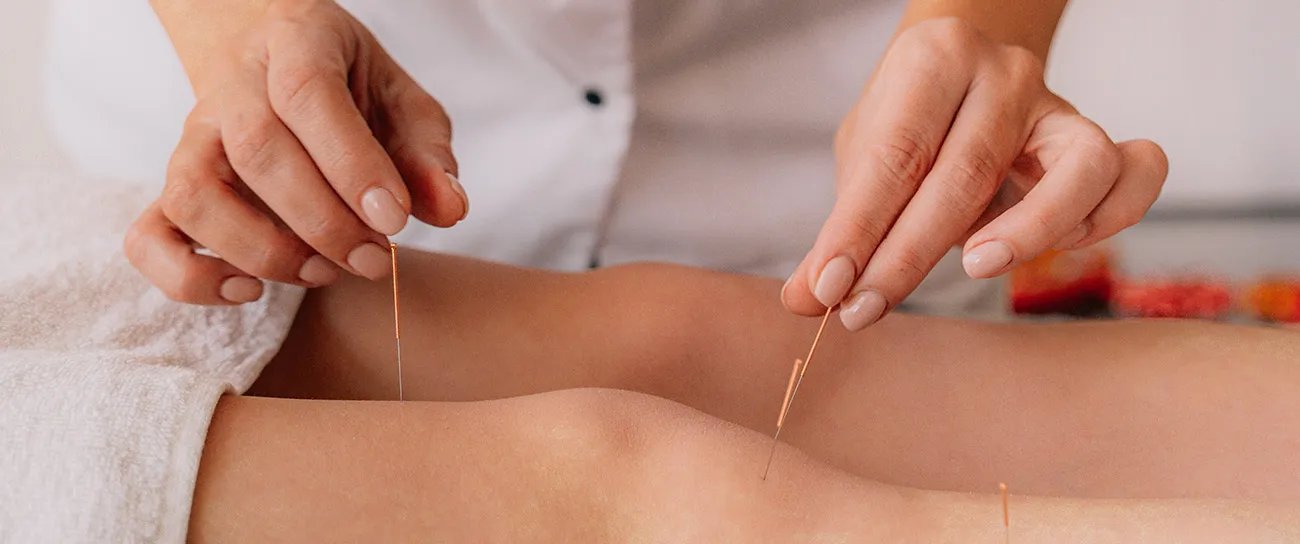
Stress and anxiety are common in modern life, affecting many Australians. When those feelings persist and start to impact daily wellbeing, it is natural to look for ways to feel better. For many, acupuncture is a part of their overall health plan.
This practice is rooted in the principles of Traditional Chinese Medicine (TCM). From a traditional standpoint, the idea is to support the smooth flow of energy (Qi) throughout the body. Modern research suggests that stimulating these specific points may help influence the nervous system, potentially moderating the body’s ‘fight or flight’ stress response.
How Acupuncture Fits Into Your Wellness Plan
It is helpful to see acupuncture as a supportive tool. A registered practitioner will often recommend it as part of a bigger picture approach to your health.
This often includes working alongside your GP or mental health professional and making positive lifestyle adjustments, such as:
Regular physical activity
Prioritising rest and good sleep habits
Following a balanced diet
Acupuncture is often integrated with other health strategies. The goal is not only to address symptoms but to support your body’s own systems and help build resilience against stress.
To help you grasp the core ideas, this table breaks down the key concepts.
Key Concepts for Understanding Acupuncture
|
Concept |
Brief Explanation |
|---|---|
|
Traditional Chinese Medicine (TCM) |
A traditional system of health and wellness that views the body as an interconnected whole. |
|
Qi (pronounced ‘chee’) |
The vital life force or energy that flows through the body along pathways called meridians. |
|
Acupuncture Points |
Specific locations on the body where Qi can be accessed and influenced to support function. |
|
Nervous System Regulation |
The modern understanding of how acupuncture may help calm the ‘fight or flight’ response. |
Understanding these foundations makes it easier to see how a treatment plan comes together.
What Does a Treatment Involve?
Your first session starts with a thorough chat. A registered practitioner will take the time to understand your specific health concerns and goals before any treatment begins.
From there, you will get comfortable while fine needles are gently placed at carefully selected points. You will then have time to rest in a quiet setting.
Beyond the acupuncture itself, your practitioner might also talk about other traditional methods. For instance, learning more about Chinese herbal medicine can give you a fuller picture of how health is supported from this perspective. This integrated approach allows your care to be tailored to your needs, becoming one part of your plan toward feeling better.
The Widespread Impact of Stress in Australia

It is no secret that stress and anxiety are part of everyday life for many of us here in Australia. The juggle of work, family, and personal commitments can build up, leaving people searching for ways to manage their wellbeing. Understanding how common this is helps explain why supportive therapies like acupuncture are becoming more mainstream.
The statistics paint a clear picture. Back in 2017–18, the Australian Bureau of Statistics (ABS) found that 25% of Australians were dealing with high or very high levels of stress. The numbers were higher for women (28.5%) compared to men (21.6%), highlighting how widespread the need for support is.
The Connection Between Mental Stress and Physical Symptoms
That feeling of being ‘stressed out’ rarely stays in your head. Prolonged stress can show up physically, which is often the point when people decide to seek help.
The Australian Psychological Society (APS) has pointed out that 72% of Australians feeling high levels of stress also experience physical symptoms. It is a reminder of how closely our mental and physical health are connected. You can learn more about the effects of stress at healthinflow.com.au.
Some of the most common physical signs linked to ongoing stress include:
Tiredness or feeling drained of energy.
Headaches or migraines.
Muscle tension, especially in the neck and shoulders.
When these physical signs become a regular part of life, it naturally prompts people to look for solutions.
Acknowledging the connection between emotional states and physical sensations is a useful step in addressing overall health. It helps explain why a multi-faceted approach to wellbeing, which may include practices like acupuncture for stress and anxiety, can be beneficial.
This growing need for stress management has sparked interest in different kinds of supportive therapies. More people are looking for practices that complement their existing healthcare and address both the mental and physical sides of stress.
The Traditional Chinese Medicine View on Emotional Balance
When you look at emotional wellbeing through a Traditional Chinese Medicine (TCM) lens, the picture is different from what we are used to in Western medicine. Instead of focusing on brain chemistry alone, TCM steps back to see the body as a whole, interconnected system where feelings and physical health are two sides of the same coin.
At the heart of this philosophy is the concept of Qi (pronounced ‘chee’), which you can think of as the body’s vital life force or energy. This energy is meant to flow smoothly through specific pathways, called meridians. When your Qi is flowing freely, you generally feel balanced and well.
But things like long-term stress, overthinking, or sudden shocks can disrupt this flow, causing it to become stuck or stagnant. It is this disruption in your body’s energy that TCM often links to the feelings we recognise as stress, irritability, or a sense of worry.
How Your Organs Influence Your Mood
In TCM, certain organ systems are seen as the home base for specific emotions. This is not about the physical organs in an anatomy textbook. It is about broader functional networks that manage both physical and emotional aspects of your health.
When we are talking about stress and anxiety, two systems usually take centre stage:
The Liver system: This system is responsible for making sure Qi flows smoothly everywhere. When Liver Qi gets stuck—often due to frustration or unresolved stress—it can manifest as irritability and tension headaches.
The Heart system: In TCM, the Heart is the seat of the mind and spirit (known as the ‘Shen‘). An imbalance here can stir up feelings of anxiety, restlessness, and make it difficult to switch off at night, leading to poor sleep.
From this traditional perspective, tackling emotional imbalance isn’t about suppressing feelings. It is about figuring out where the Qi is getting stuck and using acupuncture to get it moving freely again.
Grasping these core ideas makes it much clearer why a practitioner chooses certain acupuncture points. They use specific diagnostic methods to see these patterns in your body. To get a better idea of how this works, you can read more about understanding TCM diagnosis methods in our guide.
What Modern Research Says About Acupuncture and Anxiety
While Traditional Chinese Medicine gives us a rich, time-tested framework for emotional health, modern science is also starting to catch up. Researchers are looking into how acupuncture might physically influence the body’s stress responses, giving us another lens through which to understand its effects.
When you look at the scientific literature, you will notice the language is often careful and measured. Studies are focused on building a clearer picture of how acupuncture works, rather than making definitive claims. The general view is that acupuncture appears to be a useful part of a broader plan for managing anxiety symptoms, especially when studies compare it against placebo or control groups.
A Growing Body of Evidence
High-quality reviews are starting to show some encouraging patterns. The Acupuncture Evidence Project, a major review of scientific literature, found moderate evidence for acupuncture’s use with anxiety, labelling it as having an ‘Evidence of Potential Positive Effect’.
Out of 1,135 clinical studies on the topic, 13 were identified as high-quality, and they reported positive findings for acupuncture compared to the control groups. An Australian-focused review highlighted that 11 of these 13 studies showed statistically significant drops in anxiety symptoms. If you are keen to look into the data, you can read more on the Evidence Based Acupuncture website.
The infographic below shows which organ-meridian systems are most commonly addressed in clinical practice when treating stress and emotional imbalances.
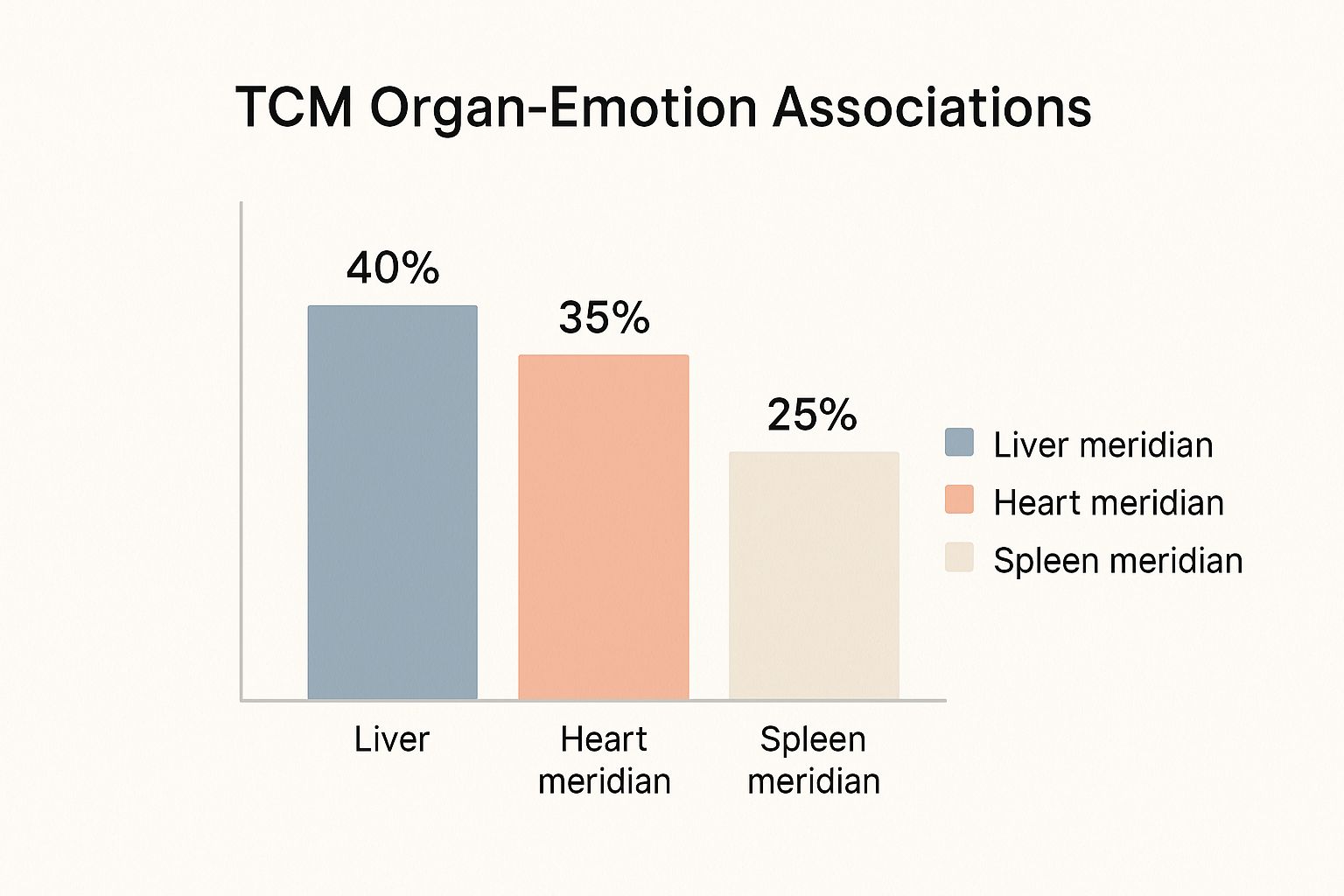
As you can see, the focus is heavily on the meridians traditionally linked to processing emotions, managing stress, and maintaining mental clarity.
It is worth remembering that scientific understanding is always evolving. The research we have is encouraging, but it is one part of a much larger, ongoing conversation. For practitioners, this evidence helps us make informed, balanced decisions when putting together a supportive care plan for clients.
What to Expect During Your Acupuncture Appointment
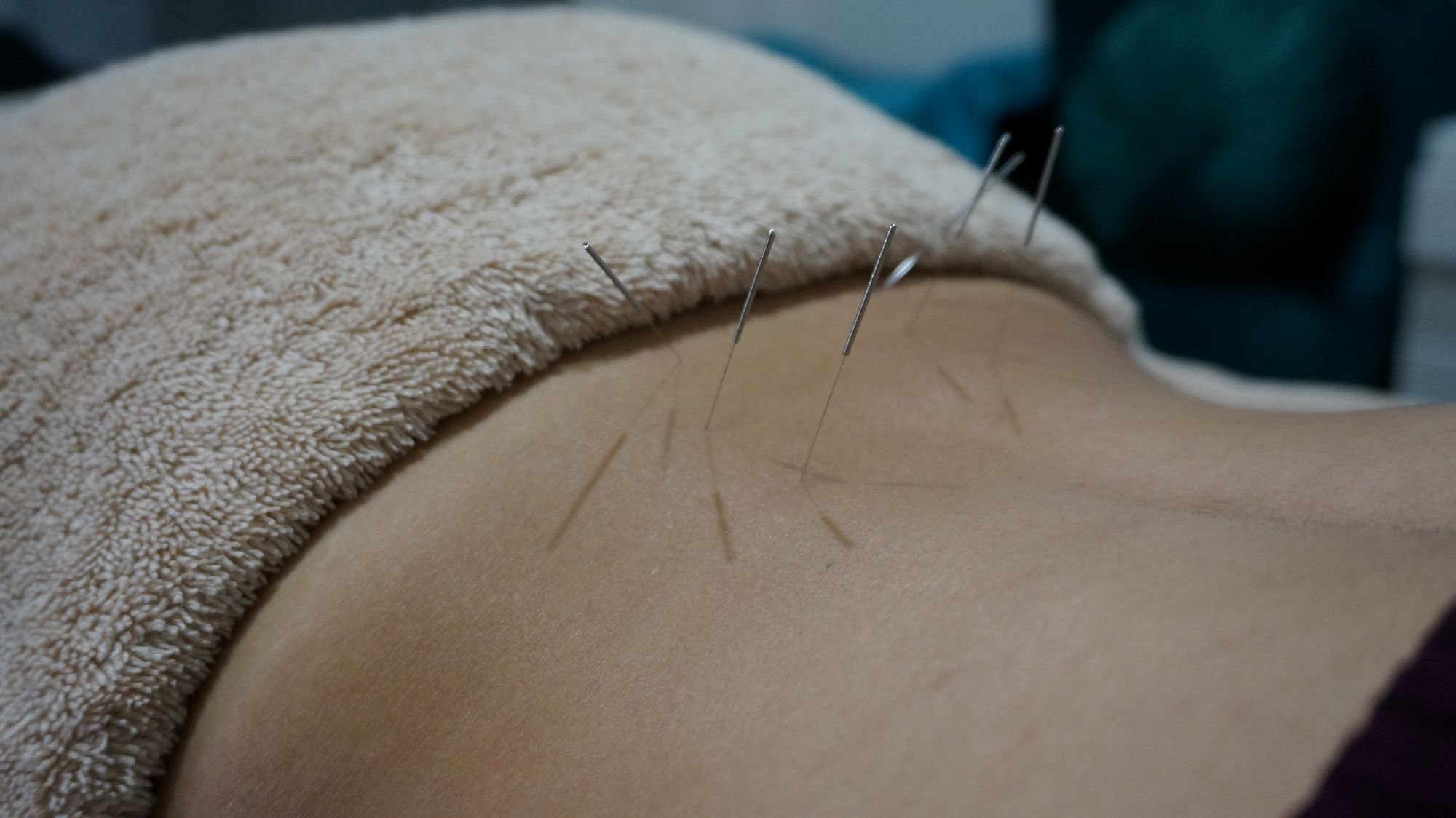
Walking into your first acupuncture appointment can feel uncertain, but the process is designed to be calm, professional, and focused on you. We follow a clear, step-by-step process to ensure you feel comfortable and supported from the moment you arrive.
Your initial session starts with a detailed conversation with our registered practitioner. This is where we get to understand your health history, the specifics of your stress and anxiety symptoms, and what you hope to achieve. This thorough chat is crucial for creating a treatment plan that is right for you.
After our discussion, you will be invited to lie down on a comfortable treatment table. From there, the practitioner will gently insert very fine, sterile, single-use needles into specific points on the body.
The Treatment Phase
Once the needles are in place, your main job is to rest. Most people lie quietly in a peaceful environment for about 20 to 30 minutes.
What does it feel like? The sensation is usually mild. Many people report a dull ache or a slight tingle right at the insertion point, which often fades quickly and gives way to a feeling of relaxation.
The number of needles and their placement are all determined by what we discussed during your initial consultation. When using acupuncture for stress and anxiety, we select points known for their ability to calm the mind and regulate the body’s response to life’s pressures.
Here at JG Alternative Healthcare, our practitioner is AHPRA registered, so you can be confident you are receiving professional and safe care.
If you are ready to see how this process can work for you, getting started is straightforward. You can book your first consultation by checking our Melbourne acupuncture clinic appointments online.
Common Questions About Acupuncture for Stress
It is normal to have questions when you are thinking about trying something new for your health. Let’s walk through some of the most common queries people have about using acupuncture to manage stress and anxiety.
Does Acupuncture Hurt?
For most people, the answer is no. Acupuncture needles are very fine—about the thickness of a human hair. They bear no resemblance to the needles used for injections or blood tests.
You might feel a tiny prick or a dull, gentle ache when the needle first goes in, but this sensation typically vanishes in a matter of seconds. Once the needles are in place, many clients describe a feeling of relaxation and calm.
How Many Sessions Will I Need?
This is a personal question, as everyone’s body and situation is different. The number of sessions you may need depends on a few things, like how long you have been dealing with your symptoms and your general state of health.
In our first consultation, we will sit down and chat about what is going on for you. From there, I will suggest a treatment plan that makes sense for your specific needs, and we will regularly check in to see how you are progressing.
Can I Use Acupuncture Alongside Other Treatments?
Yes. Acupuncture can work alongside other forms of care. Many people find it is a support to the treatments they are already receiving from their GP, psychologist, or other healthcare providers.
The key is to keep everyone in the loop. Always let your health team know about all the therapies you are using. This ensures your care is safe, coordinated, and working together for your benefit.
Is It Safe?
When performed by a registered and qualified practitioner, acupuncture is considered low-risk. Here in Australia, acupuncturists must be registered with the Australian Health Practitioner Regulation Agency (AHPRA).
This registration is your assurance that your practitioner meets strict national standards for safety, hygiene, and professional conduct. It also confirms that only sterile, single-use needles are ever used.
Why Is Acupuncture Being Considered for Anxiety in Australia?
Anxiety is now the most common mental health condition in Australia, affecting around 14% of us in any given year. With so many people affected, there’s a growing need for supportive, evidence-informed options. Some studies have suggested acupuncture may help reduce anxiety symptoms, sometimes with fewer side effects than other common treatments. You can read more about the research into acupuncture and anxiety here.
The goal of acupuncture isn’t to replace conventional medical care, but to act as a supportive partner alongside it. It is one piece of a bigger puzzle when it comes to managing your overall wellbeing.
Hopefully, these answers give you a clearer picture of how acupuncture might fit into your health plan.
Ready to see how our registered practitioner can support you? Contact JG Alternative Healthcare today.
Melbourne Acupuncture Clinic – Book an Appointment at Moonee Ponds or South Morang at https://jghealthcare.com.au
Get In Touch
Book Your Appointment Online
Moonee Ponds Or South Morang

